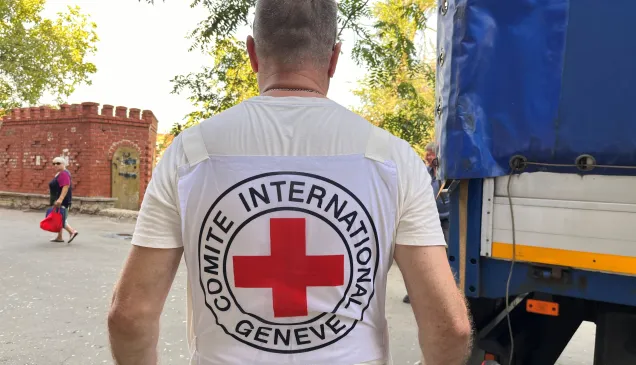United Nations, General Assembly, 70th session, Sixth Committee, items 85 of the agenda, statement by the ICRC, New York, 14 October 2015.
The International Committee of the Red Cross (ICRC) recognizes the importance that the United Nations General Assembly and the Secretary-General place on the promotion of the rule of law, through the work of the Sixth Committee, and in particular, the attention given to the role of multilateral treaty-making processes in promoting and advancing the rule of law.
By virtue of its work with people affected by armed conflict and other situations of violence, the ICRC is convinced that a clear framework of rules at the international level – accompanied by the corresponding rules at the national level – helps save lives and reduce suffering. In particular, the framework of international humanitarian law (IHL) emanates substantially from multilateral treaties – which represent an important source of internationally binding obligations on States – in addition to obligations stemming from customary international law.
States have the primary responsibility to respect and ensure respect for IHL in all circumstances. That the Geneva Conventions of 1949 are the most widely ratified international instruments - and are universally applicable - demonstrates the capacity of the multilateral treaty-making process to create a solid international legal framework.
The multilateral treaty-making process shapes the rule of law by bringing, to the attention of the community of States, issues of concern that may require regulation, via the creation of legally binding norms. It also contributes to consensus-building around important legal and humanitarian issues. The alarming humanitarian consequences of anti-personnel mines and cluster munitions, for example, triggered multilateral treaty processes that resulted in the adoption of the 1997 Anti-Personnel Mine Ban Convention and the 2008 Convention on Cluster Munitions, respectively. A similar process is credited with the adoption of the Arms Trade Treaty. The ICRC continues to urge States to adhere to these instruments and implement them.
The ICRC plays an important advisory role in the development of multilateral treaties pertaining to IHL. We observe negotiations and provide expert opinions to ensure that relevant instruments, under consideration, fully comply with and further enhance legal protections under IHL.
Another important aspect of the multilateral treaty-making process is its ability to codify customary IHL into treaties.
The ICRC is fully committed to working for the faithful application and dissemination of IHL and to prepare any development thereof. This commitment is rooted in our mandate to protect and assist victims of armed conflict - a mandate conferred upon us by the Geneva Conventions, their Additional Protocols and the Statutes of the International Red Cross and Red Crescent Movement.
The International Conference of the Red Cross and Red Crescent is another important platform for promoting the rule of law. It is the supreme deliberative body of the Movement, bringing together all components of the Movement and States Parties to the Geneva Conventions, to discuss major humanitarian issues and challenges.
The 32nd International Conference will take place in December 2015. On that occasion, a progress report on the implementation of the 4-year Action Plan for the Implementation of IHL, which falls under Resolution 2 of the previous International Conference, will be delivered. One of the objectives of the Action Plan is to improve the incorporation and repression of serious violations of IHL – which strengthens rule of law mechanisms.
The responsibility of States to respect and ensure respect for IHL includes preventing and punishing serious violations of the law, which requires States to develop clear normative frameworks, strong judicial mechanisms and effective measures to enforce accountability.
The ICRC supports the efforts of States to fulfil their responsibility within rule of law structures and mechanisms. We provide States with technical expertise on IHL, upon their request, and provide support to relevant national authorities on implementing their international obligations to prevent and punish serious violations of IHL. An example of this is the ICRC's coordination of an expert consultation on IHL, held in May 2015, with judicial officers from around the world. This consultation focused on the important role of the judiciary in the interpretation of treaties and domestic legislation. Such activities serve to enhance national capacity within rule of law structures and mechanisms.
At the regional and international level, we promote and encourage the comprehensive implementation of IHL through our work with organizations including the African Union, the Arab League, the Organization of American States, the Commonwealth Secretariat and the Asian-African Legal Consultative Organization.
In conclusion, the ICRC will continue to follow the discussions held within the Sixth Committee and other United Nations fora on the rule of law. We encourage States to continue their efforts to strengthen IHL through the multilateral treaty-making process and by ratifying and implementing legal instruments that serve the interest of humanity.



